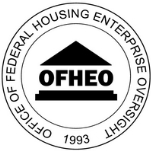OFHEO was established in by the Federal Housing Enterprises Financial Safety and Soundness Act of 1992.
House Price Index
Systemic Risk: Fannie Mae, Freddie Mac and the Role of OFHEO
(PDF)
OFHEO Receives $66.6 Million in President’s FY 2009 Budget Request
Study Finds 'Extensive' Fraud at Fannie Mae: Bonuses Allegedly Drove the Scheme
(by Kathleen Day, Washington Post)
Fannie Mae Slips Another Deadline, Freddie Mac Reform and OFHEO Wants Greater Power
(Mortgage News Daily)
- Table of Contents
- Overview
- History
- What it Does
- Where Does the Money Go
- Controversies
- Suggested Reforms
- Comments
- Leave a comment

- Latest News
- D.C. Public Schools will Teach all Second-Graders to Ride a Bike
- New Rule in Germany Limits Sales of Sex-Themed E-Books to 10pm to 6am
- What Happened to the 6-Year-Old Tibetan Boy the Chinese Government Kidnapped 20 Years Ago?
- U.S. Ambassador to Turkey Photoshops his Hair Color to Mock Turkish Mayor
- Mystery Artist Calls Attention to Unfixed Potholes by Drawing Penises around Them
OFHEO was established in by the Federal Housing Enterprises Financial Safety and Soundness Act of 1992.
House Price Index
Systemic Risk: Fannie Mae, Freddie Mac and the Role of OFHEO
(PDF)
OFHEO Receives $66.6 Million in President’s FY 2009 Budget Request
Study Finds 'Extensive' Fraud at Fannie Mae: Bonuses Allegedly Drove the Scheme
(by Kathleen Day, Washington Post)
Fannie Mae Slips Another Deadline, Freddie Mac Reform and OFHEO Wants Greater Power
(Mortgage News Daily)
Comments

- Latest News
- D.C. Public Schools will Teach all Second-Graders to Ride a Bike
- New Rule in Germany Limits Sales of Sex-Themed E-Books to 10pm to 6am
- What Happened to the 6-Year-Old Tibetan Boy the Chinese Government Kidnapped 20 Years Ago?
- U.S. Ambassador to Turkey Photoshops his Hair Color to Mock Turkish Mayor
- Mystery Artist Calls Attention to Unfixed Potholes by Drawing Penises around Them






Comments